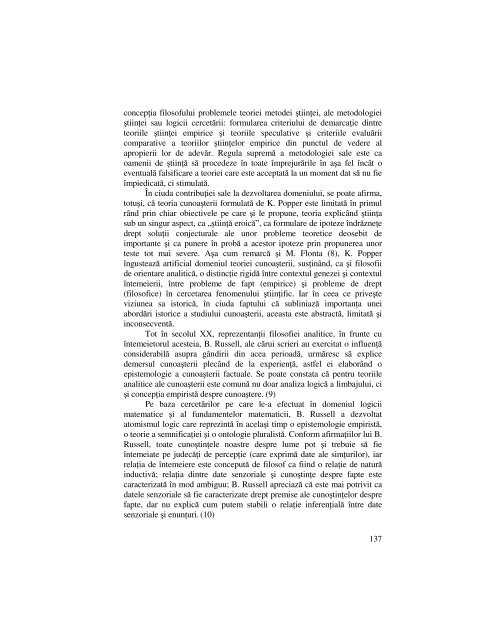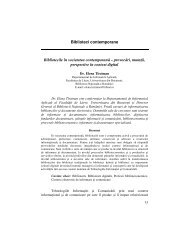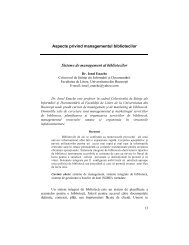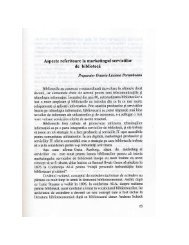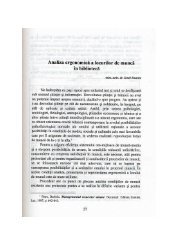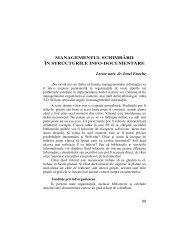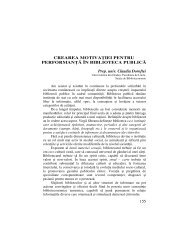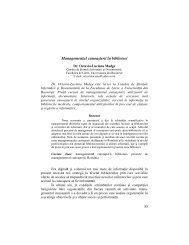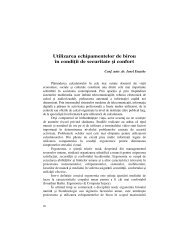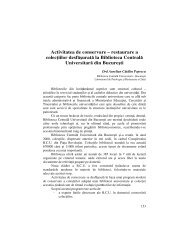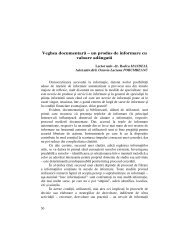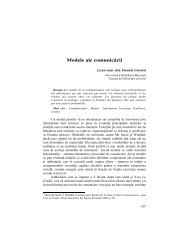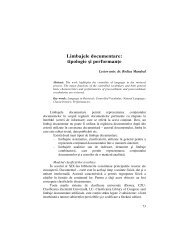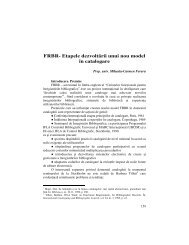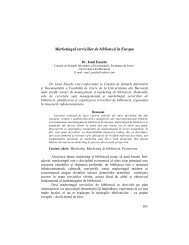Conceptul de cunoaÅtere la Karl R. Popper, Bertrand Russell ... - lisr.ro
Conceptul de cunoaÅtere la Karl R. Popper, Bertrand Russell ... - lisr.ro
Conceptul de cunoaÅtere la Karl R. Popper, Bertrand Russell ... - lisr.ro
Create successful ePaper yourself
Turn your PDF publications into a flip-book with our unique Google optimized e-Paper software.
concepţia filosofului p<strong>ro</strong>blemele teoriei meto<st<strong>ro</strong>ng>de</st<strong>ro</strong>ng>i ştiinţei, ale metodologiei<br />
ştiinţei sau logicii cercetării: formu<st<strong>ro</strong>ng>la</st<strong>ro</strong>ng>rea criteriului <st<strong>ro</strong>ng>de</st<strong>ro</strong>ng> <st<strong>ro</strong>ng>de</st<strong>ro</strong>ng>marcaţie dintre<br />
teoriile ştiinţei empirice şi teoriile specu<st<strong>ro</strong>ng>la</st<strong>ro</strong>ng>tive şi criteriile evaluării<br />
comparative a teoriilor ştiinţelor empirice din punctul <st<strong>ro</strong>ng>de</st<strong>ro</strong>ng> ve<st<strong>ro</strong>ng>de</st<strong>ro</strong>ng>re al<br />
ap<strong>ro</strong>pierii lor <st<strong>ro</strong>ng>de</st<strong>ro</strong>ng> a<st<strong>ro</strong>ng>de</st<strong>ro</strong>ng>văr. Regu<st<strong>ro</strong>ng>la</st<strong>ro</strong>ng> supremă a metodologiei sale este ca<br />
oamenii <st<strong>ro</strong>ng>de</st<strong>ro</strong>ng> ştiinţă să p<strong>ro</strong>ce<st<strong>ro</strong>ng>de</st<strong>ro</strong>ng>ze în toate împrejurările în aşa fel încât o<br />
eventuală falsificare a teoriei care este acceptată <st<strong>ro</strong>ng>la</st<strong>ro</strong>ng> un moment dat să nu fie<br />
împiedicată, ci stimu<st<strong>ro</strong>ng>la</st<strong>ro</strong>ng>tă.<br />
În ciuda contribuţiei sale <st<strong>ro</strong>ng>la</st<strong>ro</strong>ng> <st<strong>ro</strong>ng>de</st<strong>ro</strong>ng>zvoltarea domeniului, se poate afirma,<br />
totuşi, că teoria cunoaşterii formu<st<strong>ro</strong>ng>la</st<strong>ro</strong>ng>tă <st<strong>ro</strong>ng>de</st<strong>ro</strong>ng> K. <st<strong>ro</strong>ng>Popper</st<strong>ro</strong>ng> este limitată în primul<br />
rând prin chiar obiectivele pe care şi le p<strong>ro</strong>pune, teoria explicând ştiinţa<br />
sub un singur aspect, ca „ştiinţă e<strong>ro</strong>ică”, ca formu<st<strong>ro</strong>ng>la</st<strong>ro</strong>ng>re <st<strong>ro</strong>ng>de</st<strong>ro</strong>ng> ipoteze îndrăzneţe<br />
drept soluţii conjecturale ale unor p<strong>ro</strong>bleme teoretice <st<strong>ro</strong>ng>de</st<strong>ro</strong>ng>osebit <st<strong>ro</strong>ng>de</st<strong>ro</strong>ng><br />
importante şi ca punere în p<strong>ro</strong>bă a acestor ipoteze prin p<strong>ro</strong>punerea unor<br />
teste tot mai severe. Aşa cum remarcă şi M. Flonta (8), K. <st<strong>ro</strong>ng>Popper</st<strong>ro</strong>ng><br />
îngustează artificial domeniul teoriei cunoaşterii, susţinând, ca şi filosofii<br />
<st<strong>ro</strong>ng>de</st<strong>ro</strong>ng> orientare analitică, o distincţie rigidă între contextul genezei şi contextul<br />
întemeierii, între p<strong>ro</strong>bleme <st<strong>ro</strong>ng>de</st<strong>ro</strong>ng> fapt (empirice) şi p<strong>ro</strong>bleme <st<strong>ro</strong>ng>de</st<strong>ro</strong>ng> drept<br />
(filosofice) în cercetarea fenomenului ştiinţific. Iar în ceea ce priveşte<br />
viziunea sa istorică, în ciuda faptului că subliniază importanţa unei<br />
abordări istorice a studiului cunoaşterii, aceasta este abstractă, limitată şi<br />
inconsecventă.<br />
Tot în secolul XX, reprezentanţii filosofiei analitice, în frunte cu<br />
întemeietorul acesteia, B. <st<strong>ro</strong>ng>Russell</st<strong>ro</strong>ng>, ale cărui scrieri au exercitat o influenţă<br />
consi<st<strong>ro</strong>ng>de</st<strong>ro</strong>ng>rabilă asupra gândirii din acea perioadă, urmăresc să explice<br />
<st<strong>ro</strong>ng>de</st<strong>ro</strong>ng>mersul cunoaşterii plecând <st<strong>ro</strong>ng>de</st<strong>ro</strong>ng> <st<strong>ro</strong>ng>la</st<strong>ro</strong>ng> experienţă, astfel ei e<st<strong>ro</strong>ng>la</st<strong>ro</strong>ng>borând o<br />
epistemologie a cunoaşterii factuale. Se poate constata că pentru teoriile<br />
analitice ale cunoaşterii este comună nu doar analiza logică a limbajului, ci<br />
şi concepţia empiristă <st<strong>ro</strong>ng>de</st<strong>ro</strong>ng>spre cunoaştere. (9)<br />
Pe baza cercetărilor pe care le-a efectuat în domeniul logicii<br />
matematice şi al fundamentelor matematicii, B. <st<strong>ro</strong>ng>Russell</st<strong>ro</strong>ng> a <st<strong>ro</strong>ng>de</st<strong>ro</strong>ng>zvoltat<br />
atomismul logic care reprezintă în ace<st<strong>ro</strong>ng>la</st<strong>ro</strong>ng>şi timp o epistemologie empiristă,<br />
o teorie a semnificaţiei şi o ontologie pluralistă. Conform afirmaţiilor lui B.<br />
<st<strong>ro</strong>ng>Russell</st<strong>ro</strong>ng>, toate cunoştinţele noastre <st<strong>ro</strong>ng>de</st<strong>ro</strong>ng>spre lume pot şi trebuie să fie<br />
întemeiate pe ju<st<strong>ro</strong>ng>de</st<strong>ro</strong>ng>căţi <st<strong>ro</strong>ng>de</st<strong>ro</strong>ng> percepţie (care exprimă date ale simţurilor), iar<br />
re<st<strong>ro</strong>ng>la</st<strong>ro</strong>ng>ţia <st<strong>ro</strong>ng>de</st<strong>ro</strong>ng> întemeiere este concepută <st<strong>ro</strong>ng>de</st<strong>ro</strong>ng> filosof ca fiind o re<st<strong>ro</strong>ng>la</st<strong>ro</strong>ng>ţie <st<strong>ro</strong>ng>de</st<strong>ro</strong>ng> natură<br />
inductivă; re<st<strong>ro</strong>ng>la</st<strong>ro</strong>ng>ţia dintre date senzoriale şi cunoştinţe <st<strong>ro</strong>ng>de</st<strong>ro</strong>ng>spre fapte este<br />
caracterizată în mod ambiguu; B. <st<strong>ro</strong>ng>Russell</st<strong>ro</strong>ng> apreciază că este mai potrivit ca<br />
datele senzoriale să fie caracterizate drept premise ale cunoştinţelor <st<strong>ro</strong>ng>de</st<strong>ro</strong>ng>spre<br />
fapte, dar nu explică cum putem stabili o re<st<strong>ro</strong>ng>la</st<strong>ro</strong>ng>ţie inferenţială între date<br />
senzoriale şi enunţuri. (10)<br />
137


